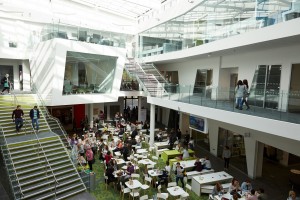Something over thirty years ago, in my first job, I remember asking a colleague how some particular process or other should work. “Oh, don’t worry,” she said, “it’s just the same as last year”. It was no doubt well-meant, but it’s obviously not a very helpful thing to say to someone who is new. In Cider with Rosie, Laurie Lee’s much-loved and often re-read memoir about growing up in remote rural Gloucestershire in the early twentieth century, Lee recalls his own first day at school, when an equally well-meaning teacher, unable immediately to find him a desk and chair, told him to wait beside her desk “for the present”. At the end of the day, he complained that he still hadn’t received the present.
Starting any new job is always a mixture of the exciting and slightly disorienting. It’s the start of my second week as Vice-Chancellor, and it’s a mildly humbling experience as I find my way around buildings, people, systems. So one thing to be said in this first blog is simply thank you – and particularly to the IT, cleaning, office and library staff who have been so helpful to me and not one of whom has told me that things are just the same as last year, or to wait patiently. You have all made my transition to a new job, in a new university in a new city, seamless and I am grateful – and also to the teams of people who are behind you and I haven’t yet met.
I’ve also begun my visits to faculties and directorates, where people have begun to explain to me, with great patience, more about the sheer range of work which is undertaken here at Sheffield Hallam University.
I spent time last week in two faculties – going from the range of our work in the humanities and social sciences through to our work in arts, technology, engineering and science. I had a whistle-stop tour which moved quickly from our innovative work on food engineering, to our work in railway engineering, training rail engineers for Network Rail and London Underground, to our TV and radio studios, to the Lab4Living – looking at some extraordinarily imaginative collaborations between designers and health specialists. Then it was on to the University’s work on packaging innovation, which introduced me to new easy-to-open jam jar lids and baked bean cans redesigned so that the ring pull is also easier to open, and then to the highly distinctive ways in which Sheffield Hallam teaches degree-level mathematics, and then to the Materials and Engineering Research Institute.

Heart of the Campus
I also learnt about the ways in which moving a cycle saddle by, literally, millimetres changes the muscle groups involved in cycling; I learnt about how the University’s ‘bobble-ometers’ are used to assess the evenness of golf course greens. I stumbled on a group of trainee midwives bent over a dummy simulating childbirth, in preparation for assessment. I enjoyed the energy and liveliness of the beautifully re-equipped University nursery. And I picked up the excellent coverage of Liam Bourke’s research on exercise training as a possible treatment for prostate cancer.
It was difficult to keep up, and I ended the week with some strong impressions. The way that everyone rightly puts students at the centre, the hard thinking about employability and how we prepare our students for some tough labour markets and, behind both of these, an overarching focus on the impact of what Sheffield Hallam does. And something else came from the first week, too, which emerged in every exchange I had – from Pro Vice-Chancellors to academics, professional support staff, caterers and cleaners: a real sense of the University as something to take pride in.
For anyone new, these things are important. For a new Vice-Chancellor, they are invaluable – and a great base on which to build. Universities matter: they drive the knowledge economies on which we will all depend through the twenty-first century and they create opportunities, knowledge and impact. Some of the things which other universities have fretted and worried about are in evidence here: a concern with impact, a concern with relevance, a concern with the University’s place in the city and the region. When I came here for interview – almost six months ago now – I had a sense of some of this; after my first week, I have an even greater sense of it. It’s a fabulous base on which to build.
This matters for another reason too: universities – and, obviously, Sheffield Hallam – are facing extraordinary change. We’ll be spending a good deal of time working through the implications of the government’s radical Green Paper on higher education – the consultation ends this week – but the Green Paper is a symptom of far wider changes. They include the continuing constraints on public funding, the far more competitive environment nationally and globally, the increased, and increasing, expectations of students, and the transformative impact of technology on teaching, learning and flows of information. In that context, issues of student experience, employability, innovation and impact are of paramount importance, and strongly cohesive institutions are likely to be the most effective at inventive responses to challenge. In circumstances when it probably won’t be “just the same as last year” in much of what we do, that’s important.